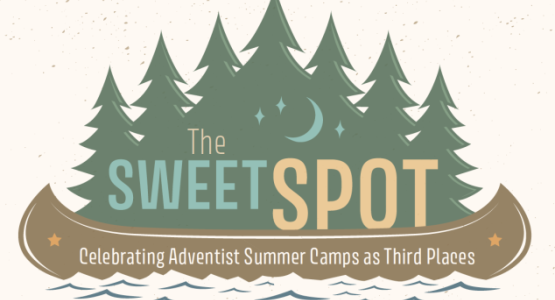
The Sweet Spot: Celebrating Adventist Summer Camps as Third Places
Feature by Nicole Dominguez
Preteens are taking over Sephora. The conversations and complaints about young adults invading spaces outside their maturity level and price brackets like the aforementioned cosmetics store go beyond the generic gripe of “kids today,” revealing a deeper need: third places.
According to many sociologists, humans were designed to exist within three spaces: home, school and the community. Though often attributed to American sociologist Ray Oldenburg’s 1989 book, The Great Good Place, the third-place concept has been practiced throughout humanity. From ancient times to the modern day, there were bathhouses, sports, salons and coffee houses where people could share ideas and form friendships.
Young people need these places more than ever. Unfortunately, this generation faces the extinction of the third place in a post-pandemic world. YMCAs are closing at a rapid rate, community centers are becoming few and far between, and parks are being bulldozed for housing developments or condemned for loitering.
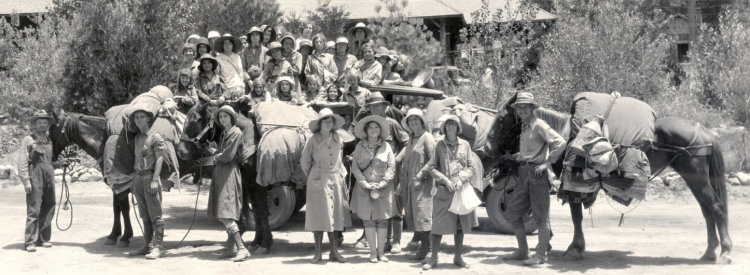 This is where Seventh-day Adventist summer camps step in. Filling a necessary gap, summer camps are a space where young people can develop community and celebrate childhood. Recognizing the need for a third place is what led Grover Fattic, East Michigan Conference youth director, and his friends to develop the first Adventist summer camp in 1926. Lasting 10 days and costing as many dollars a head, the Adventist church’s first-ever summer camp was set up at Townline Lake in Michigan for a third place that would begin an impressive legacy.
This is where Seventh-day Adventist summer camps step in. Filling a necessary gap, summer camps are a space where young people can develop community and celebrate childhood. Recognizing the need for a third place is what led Grover Fattic, East Michigan Conference youth director, and his friends to develop the first Adventist summer camp in 1926. Lasting 10 days and costing as many dollars a head, the Adventist church’s first-ever summer camp was set up at Townline Lake in Michigan for a third place that would begin an impressive legacy.
Adventist summer camps have expanded since their humble origins, answering the call to observe, reassess and adapt methods to ensure camps are meeting the needs of all who attend.
A Rite of Passage
Camp is a space where kids can have fun and explore new hobbies. In the words of former camper Karee Dudley, a member of Allegheny East Conference’s Emmanuel-Brinklow church in Ashton, Md., “It was like our own little vacation.” Dudley is a firm believer that summer camp is a rite of passage for any child, carrying her own happy memories at Chesapeake Conference’s Mt. Aetna Camp and Retreat Center in Hagerstown, Md., where she attended with her brother from third to sixth grade. For two weeks, Dudley was free to swim, play, worship, explore and go horseback riding in nature for hours on end.
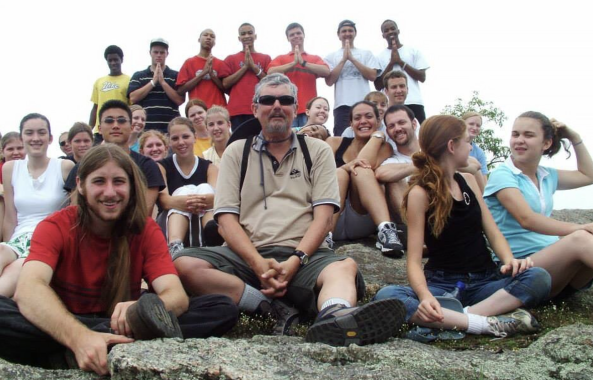
Nature—a key component to summer camp—was the method RustyLitten, a member of Potomac Conference’s New Market (Va.) church, used to introduce kids to God. For 11 years, Litten served as the Nature Reserve director at Potomac Conference’s Camp Blue Ridge (CBR) in Montebello, Va. Litten’s love for nature provided an environment of education and exploration, evidenced by the activities he led: visiting the nature center, one-day creek walks, learning about edible wild plants and participating in nature crafts. “Sometimes we would just sit and listen to the sounds of nature,” Litten says.
At summer camp, these nature activities are encapsulated within its programming. Kids who have never had access to a natural body of water or swimming pools can learn how to swim, young adults like Dudley can ride horses for the first time, and other kids who have never experienced much outside of organized sports, can go-kart, make and launch model rockets, zip line or spend time with friends around a campfire.
Where Kids Can Be Kids
Constant exposure to a world in crisis, unrealistic expectations on social media and an economy where kids are disconnected from third spaces mean summer camp might be one of the last places where kids can be kids in a safe, Christian environment.
There is an intentionality within Adventist summer camps that fosters questioning and discovery, reflection and curiosity—a crucial part of childhood. Home, school and even church might not be places where they feel safe to ask questions and be vulnerable, and secular spheres can be dangerous or offer contradictory advice.
In fact, some children who attend Adventist summer camps have never stepped foot in a church, and even those raised in church are often siloed to a youth group or Sabbath School class. Church, for some youth, are considered spaces full of grown adults with established faith. This was Natalie Reid’s experience. As a 16-year-old, she had countless questions about Christianity, however, having been raised in the church, she didn’t want the adults in her life to confuse her curiosity with rejection.
Fortunately, on the final night of camp, sitting in the summer chill at Ohio Conference’s Camp Mohaven campus in Danville, Jeff Akenberger, the camp pastor, did something remarkable: He gave her—and her fellow campers—his full attention and simply listened to them. This was a pivotal moment for Reid, who is now active in several churches on the campus of Andrews University (Mich.). She credits Camp Mohaven, Akenberger and other staff leaders for preserving her faith, leading her to become a counselor for years to come.
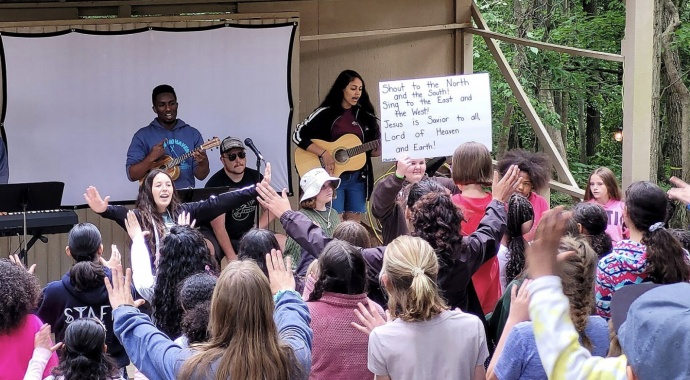 “Camp is the loudest God has ever spoken to me,” says Reid, who was a camper from ages 9–14 and, during her summer months, is a counselor and the Archery Department director at Camp Mohaven. “At camp, I have seven days to prove to a child that they are deserving of love, that they are worth adult attention and that they are not a burden. No matter what they’ve been through, kids get one week to really just be kids. To me, that is beautiful.”
“Camp is the loudest God has ever spoken to me,” says Reid, who was a camper from ages 9–14 and, during her summer months, is a counselor and the Archery Department director at Camp Mohaven. “At camp, I have seven days to prove to a child that they are deserving of love, that they are worth adult attention and that they are not a burden. No matter what they’ve been through, kids get one week to really just be kids. To me, that is beautiful.”
The 'Meat and Potatoes' of Jesus
J.P. DuKate is a veteran camp staffer at Mountain View Conference’s Valley Vista Summer Camp in Parkersburg, W.Va., who worked for seven years at the camp. Shortly before becoming a camp counselor at Valley Vista, he became an Adventist, and his experience as a staffer was a critical part of his faith journey. This journey included supporting the spiritual health of the kids at Valley Vista. “Camp is where kids can get the meat and potatoes of Jesus,” he states. “[As a staffer], I had opportunities to talk with kids about Jesus, pray with them … as well as all the singing and skits! Summer camp is about serving others; you lead and become the hands and feet of Jesus.”
DuKate, who currently worships at several house churches in West Virginia, remembers the times at Valley Vista when the young adults would congregate in the barn situated away from the main lodge. During one worship session, as the campers huddled together, tired from a day of activities in the humid, hot air, DuKate recalls how God showed up “in a marvelous place, in a marvelous way.” The campers began to sing with the worship team, drowning out the guitar until their voices rose in a chorus of praise. He reflects how faith-founded summer camps are “that ‘sweet spot’ in every religion, every denomination.”
In just one week of summer camp, lifelong friendships are sometimes established. For some, however, these relationships can transition into something deeper.
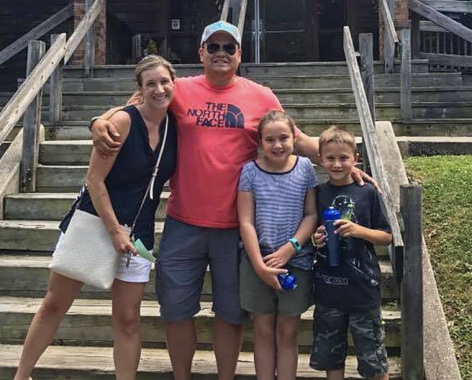
Andy Nichols, a member of Chesapeake Conference’s Frederick (Md.) church, knew that becoming the wilderness living and boys’ counselor at Mt. Aetna meant he could be near his girlfriend, finding that working at the camp unified them. It was only a few years later that Nichols would propose to his now wife, Jennifer, at the Teen Camp’s Saturday night farewell party. “My brother called her up front during a luau by the pool,” Nichols reminisces. “I got down on one knee in front of all the campers and staff. I was so nervous that I put the ring on her wrong hand. The campers and staff were so gracious about the whole thing and cheered us on.”
It was only a few years later that they sent their children, Olivia and Colton, to Mt. Aetna, experiencing a full-circle moment. This summer, Olivia, now almost 17, has her hopes set on returning to camp—this time as a staffer.
Baptisms—Past and Present
Colleen Reddick, whose membership is at Tampa (Fla.) First church, was a counselor at Allegheny East Conference’s Danny Davis Camp. She says that summer camp was much more than fun and games; faith-building was at the core of everything she encountered. “As a result of attending camp, the foundation of starting to discover God for myself surfaced,” she recalls, sharing that at the age of 15, she decided to get rebaptized at camp.
Litten says, “Ryan was a son of one of the camp leaders and my helper for four years. On the Friday of Junior Camp, he asked for me to baptize him. I am not a pastor, but the conference allowed me to do so while the camp director verbally led out the ceremony. We all went down to our favorite swimming hole that had a small waterfall, and I baptized him.”
Nadine Slifka, a member of Pennsylvania Conference’s Walnutport church, and a mother of three whose kids have all attended Pennsylvania Conference’s Laurel Lake Camp and Retreat Center in Rossiter, Pa., echoes the spiritual aspect of camp. “My daughter, Jolene, was baptized at Laurel Lake following her week at camp. Attending summer camp was also influential for Jordan, who wanted to start Bible studies, which then led to his baptism the following year. My youngest, Jaxson, keeps asking me when camp is [going to start], because he cannot wait to go back this summer.”
There Is a Flag Flying High
Adventists are well versed in the traditional sleepaway camp format; however, Carl Rodriguez introduced a different approach to the summer camp formula: FLAG (Fun Learning About God) Camp. In his former Chesapeake Conference role, Carl Rodriguez, now New Jersey Conference’s Youth Ministries director, understands that many parents are not as eager to send their kids away for the week or simply do not have the funds to do so, and that Vacation Bible School is better suited to a younger demographic.
At FLAG Camp, the kids arrive in the morning for worship, sports and crafts. In the afternoon, they go on field trips, visiting museums, nature reserves or educational organizations with the help of local pastors. Indeed, partnerships with local churches and businesses have increased visibility and variety, drawing in kids from every walk of life, while ensuring each site is tailored to meet the needs of community children. Staffed by parents and verified volunteers at each site, FLAG Camp is designed to exist within the community, introducing neighborhood kids and their families to local churches and providing a safe place for the children to stay during the summer.
 FLAG Camp is a passion project for Rodriguez, and he knows that to continue serving the congregations in the way they deserve requires an awareness of the paradigm shifts from sleep-over camp to day camp and the culture and willingness to think outside the box. “We don’t shy away from being an Adventist organization,” he states. However, Rodriguez knows that to be an aid to those in his community means adapting to the modern world with modern needs. “Rather than expecting the people to change to fit our formula of camp,” he explains, “we break down the core principles of what camp is meant to be, which is a space where kids can be who they are and learn about God.”
FLAG Camp is a passion project for Rodriguez, and he knows that to continue serving the congregations in the way they deserve requires an awareness of the paradigm shifts from sleep-over camp to day camp and the culture and willingness to think outside the box. “We don’t shy away from being an Adventist organization,” he states. However, Rodriguez knows that to be an aid to those in his community means adapting to the modern world with modern needs. “Rather than expecting the people to change to fit our formula of camp,” he explains, “we break down the core principles of what camp is meant to be, which is a space where kids can be who they are and learn about God.”
Lifelong Benefits
In the end, the legacy of Adventist summer camps is not the buildings, the programs or how many activities kids attended. The legacy of summer camp is the generations of former campers and staffers who look back on those weeks and remember a time when they got to experience a safe space—a space where they could escape from everyday pressures, and where they could experience new things with new freedom, including the introduction of a belief that was more than just their parents’ religion but a personal relationship with a God that encouraged their curiosity. These earliest childhood experiences can even impact next generations (Psalm 71:17–18, NLT).
Years later, Nichols still can’t get “Father, I Adore You” out of his head. At camp, that song welcomed the presence of God into worship each respective week of camp. “Someone was always strumming a guitar, and the wildlife serenaded us,” he says.
Reid celebrates that “camp is a place where [kids realize] they don’t have to be perfect to be loved.” Many of the staffers went on to pursue vocations which allowed them to continue supporting little kids. One of Litten’s former campers became a biologist after his weeks spent in nature. Reid is a freshman Psychology major at Andrews University, with hopes of becoming a child psychologist. DuKate became an avid volunteer for troubled youth. These individuals and many other staff members experienced the blessing of a third place and chose to extend it into everyday life.
Third places are spaces where personhood is developed, community is found and nature is celebrated. Adventist summer camps embody all these tenets, further enriched by the blessing of having fellow campers and staffers draw you closer to God and learn to know Him personally. For young minds eager to find somewhere they can be children and grow in their faith, summer camps are the ideal environment. They are more than a third place; they are the sweet spot.
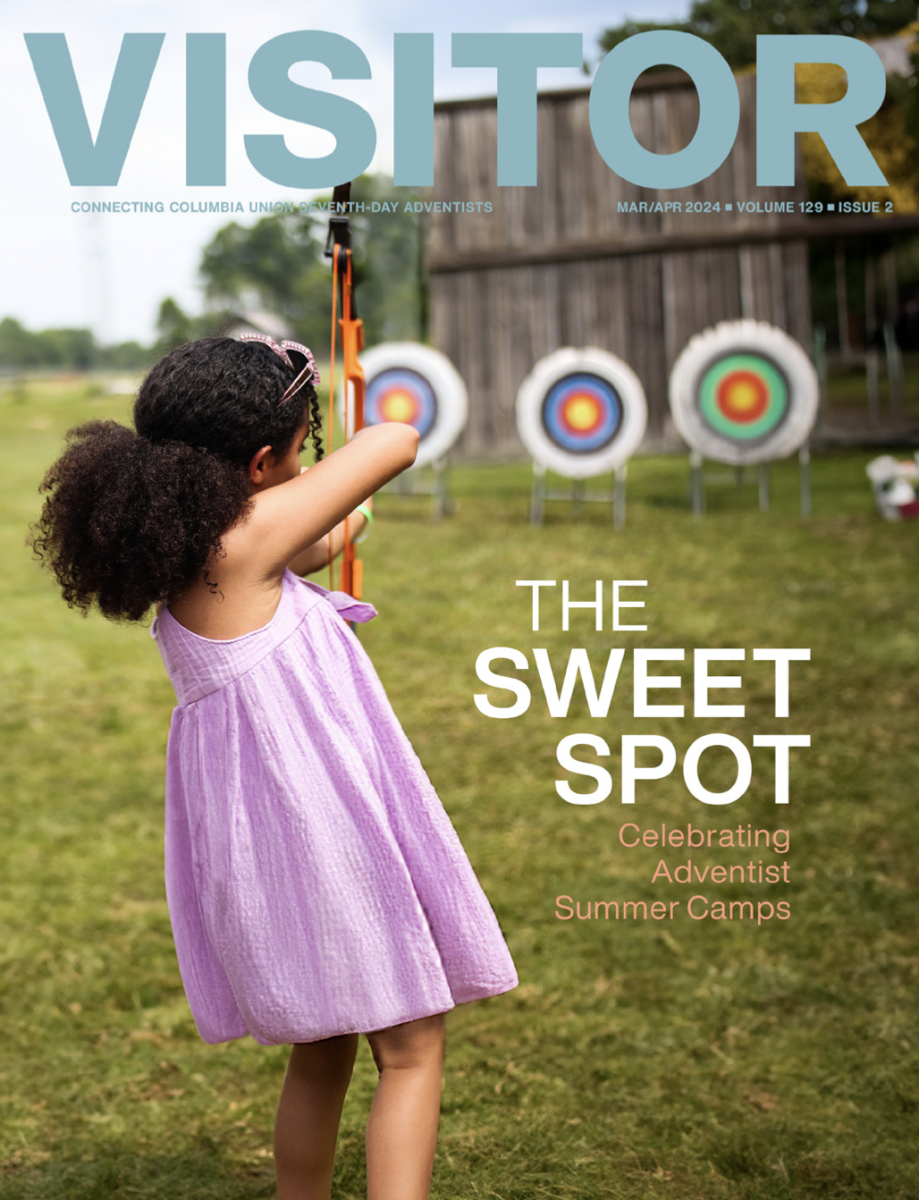 Read Articles from the March/April 2024 Issue:
Read Articles from the March/April 2024 Issue:
Add new comment